Gears of War: Judgment preview: Bigger, Bairder, more badass?
The Locust are back, but can an injection of Bulletstorm DNA keep things fresh?
It feels like things have been fairly quiet on the Gears of War: Judgment scene so far. Strange, really, seeing as it's the latest instalment in a series for which quietness is not what the marketing people might refer to as a 'brand value'. Judgment's not a particularly quiet game to play, either. Reassuringly - even comfortingly - noisy, it's loud enough to dislodge ceiling cornices and to send loose change spasming across tabletops. It has perhaps picked up a reputation for being something of an afterthought, though: the trilogy's over, the main character is MIA, the bulk of the original developer is presumably doing other things.
What this gloomy reading of the situation ignores, though, is that the new co-developer is People Can Fly, the studio behind Bulletstorm, a brilliantly constructed game that redesigned first-person shooters as a kind of quick-witted take on bar billiards. Bulletstorm set its levels alight with delightful regularity, but its effect on the charts was much more, well, quiet actually. At least some of its electro-hillbilly DNA has survived here.
It's alive and well in Judgment if you know where to look for it, in fact. It's not seen in the scripting or the story, necessarily, which, from the hour or so I've played, have none of Bulletstorm's charm or knowing wit (sample line: "I can't believe I'm looking for the missile that burned half my face off!" Agreed, good buddy. What a drag!) but it's there in the new approach to ranking, which sees you earning a series of stars for each level as you play - stars which rack up all the quicker if you shoot with style, picking off headshots, say, or taking less damage. It's there in crazy new weapons like the Booshka, too, which I may well have just misspelt. No matter: the Booshka's a grenade launcher that sends its explosive charges pinging away from you at funny angles, rebounding unpredictably before landing in someone's lap and letting rip. Who cares how it's spelled?
Unpredictability seems to be the order of the day, in fact: Judgment's campaign showcases a new feature called the Smart Spawn System, which changes the placement and frequency of emergence holes - the dank, smoking pits that the locust like to swarm up out of - from one playthrough to the next. The whole thing - or even the hole thing - seems to be aiming for an effect that's roughly equivalent to some of the director's nastier antics from Left 4 Dead: it will try to surprise you, to wrong-foot you, to corner you and then lay on the pain.
Smart spawning's joined by a new feature referred to as 'declassified testimony', too - a rather fusty piece of terminology for a series that once sent you up against a giant worm. Judgment's story is told in a series of flashbacks as Baird and his crew recount their adventures to a military tribunal in an effort to explain why something big has presumably gone rather badly wrong. Delayed decoding! Each chapter of the campaign focuses on a different character's narrative, so you'll get to play as Baird one minute and Cole the next, say. At various points along the journey, you'll come across glowing skull-shaped marks splashed across walls. These marks are your cue that you'll be able to declassify the testimony if you so wish, which amounts to making things more difficult for yourself in return for a boost to the rate at which you earn stars. One mission might declassify and then limit you to using a certain type of weapon, say, or throw in elite monsters. Another might dial up the wind - dialling down the visibility at the same time. It's just punishing enough to give you pause before making a decision.
The Judgment campaign takes place shortly after the initial arrival of the Locust, which means it's a prequel to the main Gears trilogy. The visual design seems to be channeling World War II fairly heavily: the first level is set amongst the rubble-strewn cobbles of a city that could very well be Paris during the Nazi invasion if not for the odd piece of futuristic tech, while a later section - which is absurdly, thunderingly challenging - re-stages the Normandy landings as you wade ashore at Onyx Point, taking out machinegun nests to advance up the beach. Throughout all this, it's Gears at its best: fast-paced but still tactical, with a decent churn of grim objectives and violent options. The Booshka is a gloriously haphazard ally, and suggests People Can Fly have finally given the series what its original custodians never quite could: a weapon that slots in alongside the Lancer and manages to be almost as charismatic.
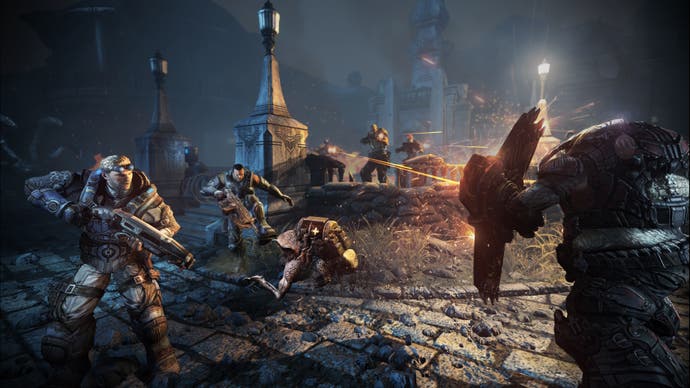
Judgment is balanced to be tough and replayable, which is a good thing, as I sense it's also going to be fairly short. Luckily, it's not the game's only single-player element. Earn a certain number of stars and you'll unlock Aftermath, a mini-campaign that takes place around the end of Gears of War 3, again following Baird and his squad as they try to finish the fight (Finish the Fight was a Gears thing, right?). It should last you around two hours, according to the people I spoke to, and it turns Judgment into a fairly unusual beast: a sort of bookend set for the main trilogy, kicking things off and tying them up. If you wanted to draw an analogy involving another famous Microsoft series, Judgment feels like the Gears equivalent of ODST: it changes the pace, meddles with a few of the periphery systems, and seeks to offer a little more inventiveness in the way that the narrative unfolds.
Beyond that, there's multiplayer, enlivened, this time, by Survival, a class-based co-op offering in which you defend a control points from increasingly horrible waves of enemies. Maps are large and complex, the rhythm is suitably relentless, and each class comes with a specific load-out and a neat skill. The engineer can repair the barbed wire barricades slung around the battlefield, for example, while the scout can climb certain objects and throw down beacons that tag any enemies that pass through them. It's lovely stuff with five players - a more focused, technical kind of Horde game. In its shuddering blasts of artillery and artfully placed cover it feels just like Gears. In its tight, quietly clever tactical focus, it feels just like Bulletstorm.
That holds true for Judgment as a whole, in fact - at least from the couple of hours I've played. Gears may be in the hands of another developer, but it's looking to be a surprisingly sympathetic union. If you're going to chase after the missile that burned half your face off, you could hardly be in better company.
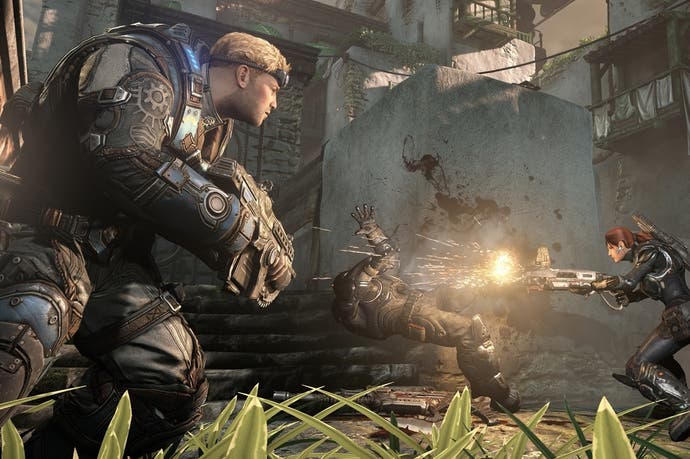



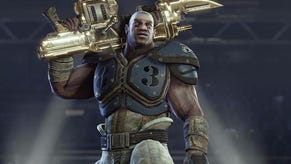
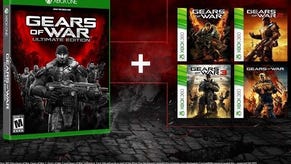
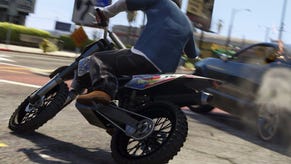

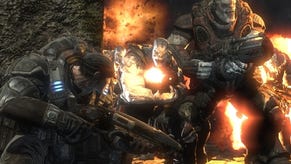
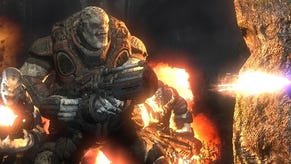



.png?width=291&height=164&fit=crop&quality=80&format=jpg&auto=webp)



